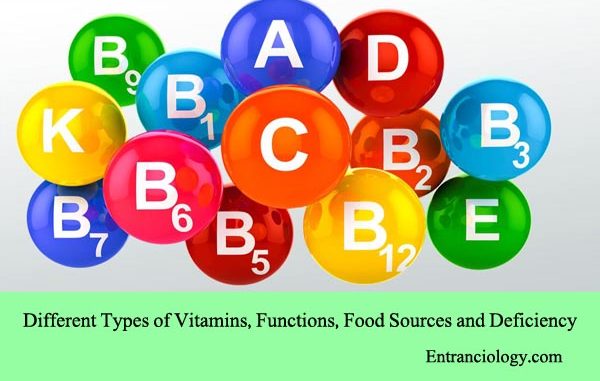
Vitamins are a group of substances that are essential in very small quantities for normal functions of the body. This term was first appeared in 1912 by Funk. Their deficiency causes sickness, and improper development of the body. At present six of these vitamins are recognized as essential to human nutrition. These are Vitamin A, Vitamin B, Vitamin C, Vitamin D, Vitamin E and Vitamin K. The richest sources of vitamins are green butter, fruits, vegetables, milk, eggs etc.
Types of Vitamins with their functions, food sources and related deficiencies:-
Vitamin A: It is a general health giving vitamin, and it increases resistance to various infection and tones up the whole system. Its deficiency causes Disorders of skin, Night Blindness, stomach growth and respiratory diseases. It is found in butter, carrot, egg-yolk, milk, ghee, and cod-liver oil etc.
Vitamin B: It is present in cereals, peas and beans. It protects the body from nerve diseases such as Beri-Beri, Pellagra etc, and it cures Pernicious, Anaemia, Degeneration of sex glands and enlargement of liver and adrenals. It is also called Thiamine, and is considered to be a hormone.
Vitamin C: The vitamin ensures healthy teeth, bones and protects the body against scurvy. It is present in Oranges, Fresh Vegetables, Lettuce, Lemon, Cabbage, Tomato, Potato, Turnip, Mango etc. Vitamin C is water soluble, and also called Ascorbic Acid.
Vitamin D: This vitamin is present in ghee, cod-liver oil, milk, butter, yolk of eggs, and it is also produced under the skin of the body by the rays of the Sun. Vitamin D helps bone promotion, and prevents a disease called Rickets.
Vitamin E: The vitamin has vital influence on organs of reproduction. The absence of it causes sterility. It is present in the germinating Wheat, and it is also called Alpha-Tecopherol.
Vitamin K: It is found in Wheat, Fish and Oats. It helps in the clotting of blood. Its absence causes a very serious disease called Haemorrhage.


